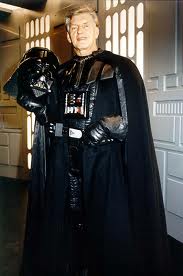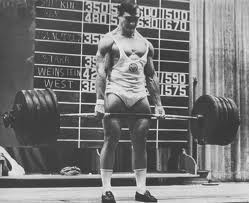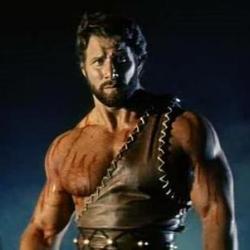How to Get Stronger: Learning from the Strongest.
How Strong is Strong Enough?
“How much strength training should I do?” is a question I am often asked, or more likely “Why should I lift weights?” But these questions have been around for some time as the following Old School strength gurus like Dave Prowse of Star Wars fame will tell you.
Our regular readers and athletes will know the approach we take working on all aspects of the Strength Spectrum, but in different degrees according to age, stage and sport.
I recently met Tony Caldwell, and ex Powerlifter on a Level 1 S&C course I was running. He had some interesting thoughts and stories on his past and that of his peers. I thought it would be interesting to share some of his thoughts.
We have some shared history as we both trained at the Crystal Palace Weightlifting Centre in our careers (him some time before I was born!).
Tony Caldwell Training Background
My own career is fairly unremarkable really but here goes! I played rugby both union and league at school and local club level as I grew up in Yorkshire.

Dave Prowse
Around 1966 after moving to Surrey with my parents I started training at the Crystal Palace National Recreation Centre under the tutelage of Dave Prowse who at that time was British Heavyweight Olympic Lifting Champion.
He later went on to fame and fortune as Darth Vader. The objective was to gain some strength & size to aid me in rugby.
The workouts revolved around about 6 basic compound exercises including some Olympic lifting such as clean & press, power cleans & jerks.
At that time the overhead press was one the Olympic lifts but was dropped sometime around the late 60s as it became difficult to referee (a bit like the scrum now!)
In 9 months I gained from 9stone 7lbs to 11 stone using this routine 3 times per week and basically eating anything that didn’t bite back.
I would use this approach even now for someone who really needed to gain size and strength.
Over the years some of my best gym poundages were 330lb bench press, 400lb dead lift and 415lb squat. In competition these were somewhat less 285, 380 and 365 respectively at a body weight of just under 13 stone. I only competed at local level and also dabbled in some bodybuilding competition, although I never liked the extreme dieting and was not willing to take the steroid route.
Old School Strength Training Methods
As a Powerlifter, I used some of the methods advocated by these legends over the years.
Bill Pearl. A 4 time Mr. Universe winner who during the 1960s planned and delivered the fitness training for NASA astronauts and who also has a background in wrestling.
Pearl is 80 yrs old now but is still in great shape training every day. His website contains much information including a complete free course entitled 20 months to a championship physique.
His teaching is very much aimed at bodybuilders & people who just want to improve their appearance therefore is fairly high volume and time consuming. The routines are well explained however and are useful for the very good exercise illustrations.

Bill Starr
Bill Starr. He was a USA national Olympic lifting champion in the 1960s and was probably the first S&C coach in the NFL when he joined Baltimore Colts around 1970. I believe he was also fitness coach for Washington State University football around this time.
He developed the 5×5 system whereby he utilised what he called the “Big 3” namely power clean, bench press and squat and had his athletes working with heavy weights on a 5 sets of 5 reps routine.
He would also change things around occasionally and use exercises such as rows and incline & overhead press. He also wrote a book called “The Strongest Shall Survive” Read Starr’s Starting Strength Article here
Reg Park. Park used a 5×5 system in the 1950s before Starr developed his own and I think you can still purchase his course. He was a 3 time Mr. Universe winner and one of the strongest bodybuilders ever with lifts such as 500lb bench press 600lb squat and incredibly 300lb press behind neck.
This was pure old school strength as Park had no background in Olympic lifting. There is a website but sadly Reg passed away about 3 years ago at the age of 79 as a result of skin cancer. (Old bodybuilders spent their whole lives in the sun!)
HIT Training. At the other end of the spectrum is High Intensity Training or HIT. Basically this is the complete polar opposite of what Pearl recommends and refers to the performance of 1 or at the most 2 sets taken to complete failure. This after warm ups.
Generally the exercises used are heavy multi joint exercises such as squats, leg presses for legs benches & inclines for chest overhead presses for shoulders etc etc.
Rest periods are short and for this reason most advocates of this type of training do not include any aerobic training as they feel that this makes inroads into the recovery system when the workouts themselves are extremely taxing on the central nervous system. Workouts are brief (usually less than 30 minutes) and infrequent (2 per week average)
Proponents of this are people such as Arthur Jones (Nautilus) Mike Mentzer, Ellington Darden and Dorian Yates. The system first surfaced in the 1970s, is quite controversial and does generate a lot of discussion.
Tony Caldwell (Old school strength coach)
(Strength training tips from Strongman Glenn Ross here)


Very interesting and a good read!
Thanks a lot for your insights and thoughts Tony. It is great to look back at these books and articles and realise what was happening 40-60 years ago and before.
How much has improved since then? You need to lift heavy and eat well.
For me working with sports people, it is knowing how and when to apply this strength training.
Thanks for sharing Tony and for the references. There is much to learn from the old school while at the same avoiding being overloaded with new studies.